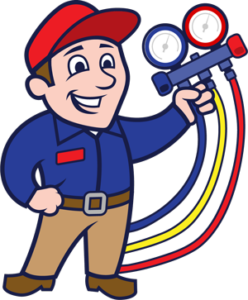Benefits of HEPA Air Filters
Indoor air quality is easy to overlook. Yet, the air circulating throughout your home may be laden with invisible pollutants such as pollen, pet dander, mold spores, and dust mites that trigger allergy symptoms and asthma attacks.
Thankfully, the remedy could be as simple as installing a HEPA air filter, which cleans the air better than any other type of filter. Still, it might surprise you to learn that HEPA filters and HVAC systems don’t mix. Learn more about HEPA filters and how to use them properly in your Annapolis or Pasadena home.
Understanding HEPA Filters
The effectiveness of air filtration is measured using the minimum efficiency reporting value (MERV) scale, a standard developed by the American Society of Heating, Refrigerating and Air Conditioning Engineers (ASHRAE). The MERV scale ranges from 1 to 20, with higher numbers indicating a greater ability to filter smaller particles from the air.
HEPA, which stands for high-efficiency particulate air, represents a type of mechanical air filter. HEPA filters are capable of trapping 99.97% or more of dust, pollen, mold, bacteria, viruses, and other airborne particles down to 0.3 microns in size. This level of filtration efficiency, rated at MERV 17 to 20, is unmatched by any other mechanical filtration method, making HEPA filters the top choice for those looking to enhance indoor air quality.
Selecting and Using HEPA Filters
HEPA filters are most commonly found in room air purifiers, which come in different sizes and configurations to cater to varying needs. When considering a HEPA-fitted air purifier, determine the volume of air the filter can clean and ensure it’s suitable for the space where you plan to use it. Typically, any room where you spend prolonged time, such as your bedroom, is the ideal place for a HEPA air purifier.
Another common use for HEPA filters is in household vacuum cleaners, which help trap more dust from the exhaust. People often find that their allergy symptoms improve when they use HEPA-equipped vacuum cleaners because they prevent the redistribution of dust and allergens back into the room.
How Much Do HEPA Filters Help?
Using a HEPA filter can significantly reduce airborne particles that aggravate allergies and asthma. However, airborne particles are only one part of the equation. Many allergens and irritants reside on surfaces like rugs, drapes, countertops, and upholstery. Therefore, taking a comprehensive approach to reduce allergens is a must. Here are other ways you can improve indoor air quality besides running an air purifier:
- Vacuum regularly with a HEPA-equipped vacuum cleaner.
- Replace carpets with wood, tile, or vinyl flooring.
- Keep pets outdoors if you’re allergic. At the very least, make your bedroom a pet-free zone.
- Change bedding frequently and wash sheets in hot water.
- Replace drapes and curtains with roll-up shades.
- Use hypoallergenic covers over mattresses and pillows.
What About HEPA HVAC Air Filters?
At first, you may assume that integrating a HEPA filter into your HVAC system is a logical step toward cleaner indoor air. However, this isn’t the best choice due to the restrictive nature of HEPA filters, which can raise HVAC operating costs, impede airflow, and cause the blower motor to overheat.
In short, residential HVAC systems are not designed to handle the resistance posed by dense HEPA filters. The key is to balance the purchase price and operating cost with filter efficiency. While highly efficient, MERV 17 to 20 filters are simply too thick and tightly woven for residential HVAC systems to handle.
Therefore, filters rated MERV 16 and lower are generally recommended for residential use. Even at MERV 13 to 16, you may need a technician to modify your HVAC equipment to ensure compatibility. Expect operational costs to go up if you choose such an efficient filter.
Selecting the Right MERV Rating for Your HVAC Air Filter
Feel free to use HEPA filters in your home’s air purifiers and vacuum cleaners. But when the time comes to replace your HVAC air filter, aim a little lower on the MERV scale. Here’s a breakdown of the most popular furnace and air conditioner filters and how they perform:
- Disposable fiberglass filters (MERV 1 to 4): These basic filters are designed to capture large particles like lint, dust, and pollen. However, they do very little to improve indoor air quality as they cannot trap smaller particles.
- Disposable pleated air filters (MERV 5 to 8): With a pleated surface made of polyester or cotton, these more efficient filters are capable of trapping particles like mold spores and fine powder down to 3 microns in size.
- Disposable and permanent electrostatic air filters (MERV 8 to 10): The disposable versions usually rate around MERV 10, while the permanent versions are closer to MERV 8. They can trap particles like milled flour, welding fumes, and auto emissions as small as 2 microns.
- Rigid-style cartridge air filters (MERV 11 to 12): Ranging from 6 to 12 inches deep, the crisscrossing pleats found in these filters are efficient enough to trap tiny particles down to 1 micron, including some types of bacteria. Rigid-style cartridge filters can be used in residential applications but are often reserved for high-end commercial buildings and hospitals.
Get Expert Guidance on Choosing Air Filters for Your Home
Selecting the right air filter can feel daunting, but the process is much more straightforward with expert assistance from Barstow and Sons Heating and Cooling. As a local, family-run business serving Annapolis and Pasadena, MD, for over 40 years, we provide personalized indoor air quality solutions to help you breathe easier. Expect fair, affordable pricing and exceptional customer service as we help you pinpoint the best air filters for your family’s needs. Contact us at 410-777-9185 today to speak with a friendly team member about improving your indoor air quality.



